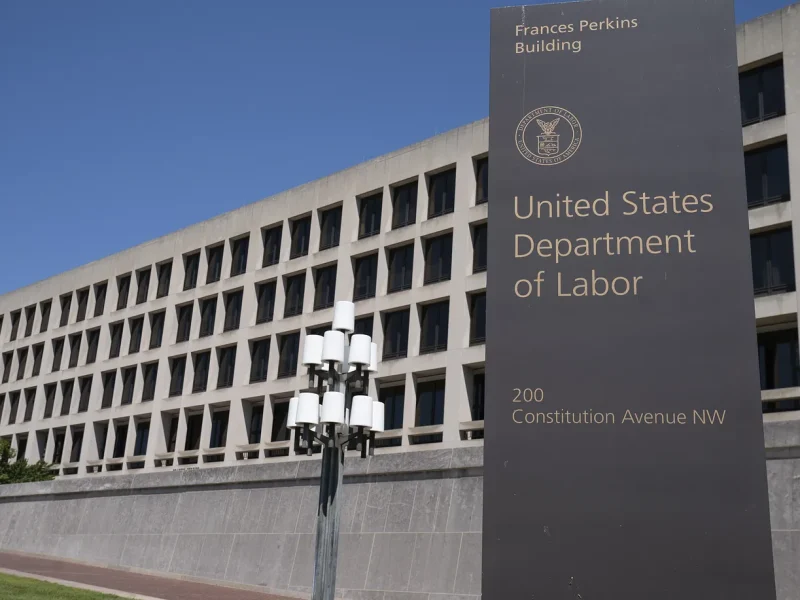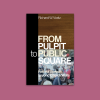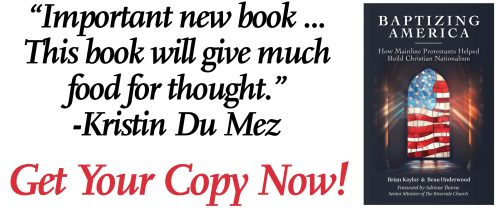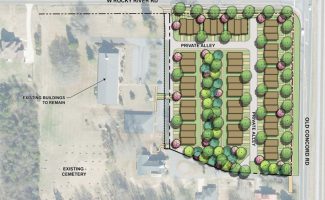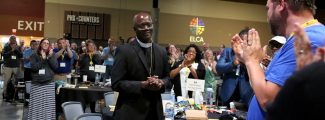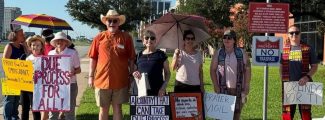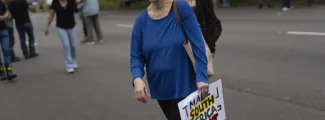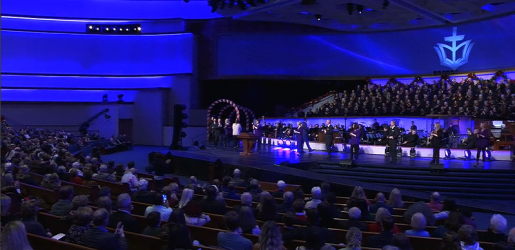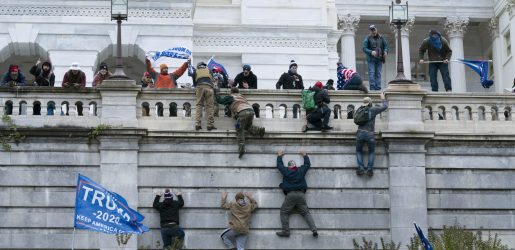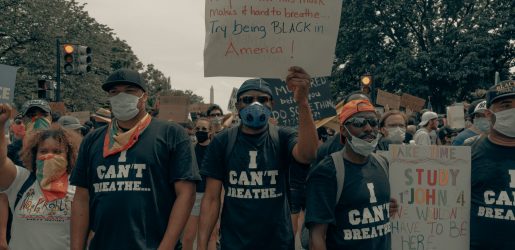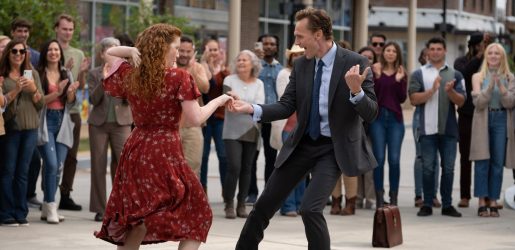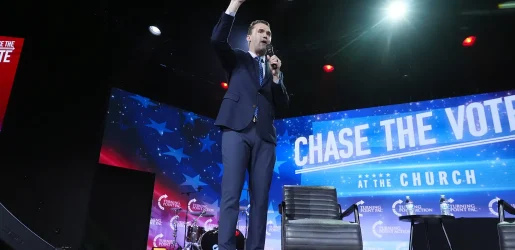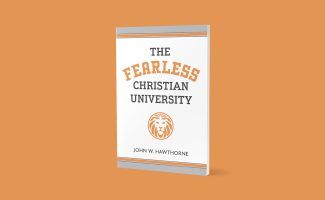Sign up to receive full essays in your inbox!
Featured
At Labor Prayer Service, Alveda King Tells Government Employees to Work (Without Complaining) or Don’t Eat
Amid an internal investigation into Secretary Lori Chavez-DeRemer, the Department of Labor held its second monthly worship service featuring the rightwing anti-abortion activist niece of MLK.
Review: From Pulpit to Public Square
Through insightful reflections, practical exercises, and thought-provoking questions, Richard Voelz redefines how to do theology outside of a church context.
America Has Eye Trouble
The ICE shooting in Minneapolis, like the Jan. 6 insurrection, brings into sharp relief two different visions in America. Many of us now filter what we see through a pair of political eyeglasses, blurring facts with ideology.
Church
For a Small Charlotte Church, Selling Some Land Has Meant Finding Its Soul
Newell Presbyterian is part of a growing trend of declining congregations with underutilized space, excess land or deteriorating buildings that are selling or leasing some of their land for affordable housing.
How a Former Schoolteacher Became the Next Lutheran Presiding Bishop
The Rev. Yehiel Curry, a former lay church planter, will be installed as presiding bishop of the Evangelical Lutheran Church in America in October.
Dallas Clergy ‘Bear Witness’ With Prayer Vigils Outside ICE Office
Mara Richards Bim, the new Justice and Advocacy Fellow at Royal Lane Baptist Church in Dallas, spoke about how to bridge what we talk about in church and political action.
Nation
In Minneapolis, Clergy Mobilize to Manage Expected ICE Raids Targeting Somali Immigrants
Preparing for ICE agents’ presence in the city, an interfaith coalition shared best practices for dealing with law enforcement at houses of worship.
The Trump Administration’s Favorite Fake Prayer Story
This issue of A Public Witness looks at the truth behind the Christian Nationalist fable of George Washington praying at Valley Forge.
West Virginia Again Bans Religious Reasons for School Vaccine Exemptions
West Virginia’s school vaccination policy has long been heralded by medical experts as one of the most protective in the country for children.
World
African Christians Walk Hundreds of Miles for Uganda Martyrs’ Day
Joining this year are dozens of leaders from different Christian denominations, making the journey not only an expression of personal devotion but a public show of unity and spiritual leadership in a region challenged by political instability, poverty, and insecurity.
The Only ‘Refugees’ Trump Wants
This issue of A Public Witness looks at what’s happening with U.S. refugee resettlement and the South African Christians pushing back against the apartheid theology propping up the Trump administration.
Robert Prevost, First Pope From US in History of the Catholic Church, Takes the Name Leo XIV
The 69-year-old Chicago-born missionary who spent his career ministering in Peru and belongs to the Augustinian religious order caught the world by surprise when he was elected to be the 267th pope.
Editorials
For the Director of Music (at First Baptist in Dallas)
Editor-in-Chief Brian Kaylor offers some seasonal advice to the music director at First Baptist Church in Dallas, Texas, ahead of Sunday’s worship service that will include former President Donald Trump.
Unsettling Advent, Day 18
In day 18 of our Unsettling Advent devotional series, Word&Way Editor-in-Chief Brian Kaylor reflects on violent insurrections during the time of Jesus’s birth and what that can teach us today.
Unsettling Advent, Day 9
In day 9 of our Unsettling Advent devotional series, Word&Way Editor-in-Chief Brian Kaylor reflects on racial injustices in the U.S. and how this helps us understand the birth of Jesus.
Word&Way Voices
How to Train Your Compassion
Hiccup from the ‘How to Train Your Dragon’ movie shows his community a better way to be a Viking in a manner that keenly echoes the life and teachings of Jesus.
‘The Life of Chuck’ Contains Multitudes
A new film by Mike Flanagan, based on a Stephen King short story, deals with the power and significance of one life and points to the Story within the story.
Gaza-Born American Baptist Pastor Discriminated Against
The Trump administration often speaks of protecting Christians from discrimination worldwide. But that concern seems to vanish when Israel is involved — even with a Baptist pastor serving as the U.S. ambassador to Israel.
E-Newsletter
Not Worth It
In life and in death, Charlie Kirk represented the worst of American politics. He stoked dangerous conspiracies, attempted to silence voices he disagreed with, and utilized violent rhetoric mixed with a godly veneer. Then, someone decided to respond with evil by picking up a gun to silence a life.
‘Where Were Those Thousands of Christians?’
This issue of A Public Witness covers a 1979 Sunday School lesson from President Jimmy Carter — with concerns eerily fitting for 2025 — taught at the First Baptist Church of the City of Washington, D.C.
Make Measles Great Again
This issue of A Public Witness dons a mask before carefully treading into the dangerous medical — and religious — anti-vax world of Florida Surgeon General Joseph Ladapo.
Books
Review: The Fearless Christian University
In “The Fearless Christian University,” sociologist and educator John Hawthorne laments the fact that fear has become a defining characteristic of many Christian schools today.
Review: Pilgrim — A Theological Memoir
In “Pilgrim: A Theological Memoir,” Tony Campolo traces his evolution as a believer, scholar, and evangelical leader who continually sought to engage thoughtfully with the challenges of his time.
Review: Knock at the Sky
In “Knock at the Sky: Seeking God in Genesis After Losing Faith in the Bible,” Liz Charlotte Grant interprets the Bible’s inspired book of beginnings as a work of art.
Review & Giveaway: To Love Our Neighbors
Joe Blosser’s recent book is challenging because it takes seriously the idea that the only way to love God well is to love our neighbors more by re-evaluating how much we’ve fallen in love with ourselves.

